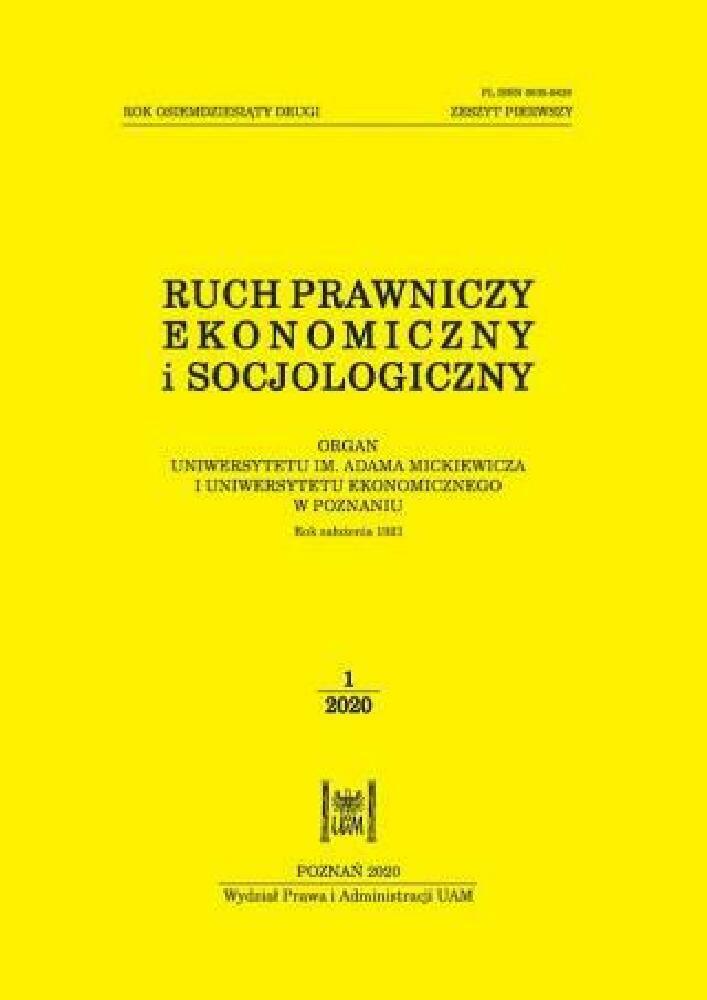Abstract
The purpose of this article is to conduct an axiological and legal analysis of the most popular model of participatory (civic) budgeting in Poland (the plebiscite model). According to the adopted hypothesis, some legal and practical solutions concerning the plebiscite model strengthen public values, while others weaken them. In the research, the combination of three coherent methods was used: (i) a literature analysis, (ii) the dogmatic and legal method, and (iii) interviews conducted with municipal officials responsible for the organization of participatory budgeting (PB), municipal councillors and residents (BP participants). The research covers six Polish cities: Sopot, Gdańsk, Białystok, Kraków, Opole and Warsaw. The axiological and legal analysis of the principles and mode of BP was made using a catalogue of nodal public values, namely values with a significant number of related values (including: human dignity, sustainability, citizen involvement, openness, secrecy, compromise, integrity, and robustness). The research leads to the conclusion that the plebiscite BP in Poland is not axiologically neutral, its principles and mode have both a positive and negative impact on particular nodal public values. The scale of negative impact is definitely greater than the scale of the positive one, although, obviously, the assessment in this respect, even if supported by arguments and scientific analysis, will always remain at least partly subjective.
References
Bitner, M. (2018). Opinia dotycząca wybranych kwestii intertemporalnych związanych z utworzeniem budżetu obywatelskiego. .
Dias, N., Júlio, S. (2018). The next thirty years of Participatory Budgeting in the world start today, [w:] N. Dias (ed.), Hope for Democracy. 30 Years of Participatory Budgeting Worldwide.
São Brás de Alportel: 15–34.
Drozdowski, R., Frąckowiak, M. (2013). Bilans społecznej wyobraźni. Komentarz socjologiczny do poznańskiego budżetu obywatelskiego. Ruch Prawniczy, Ekonomiczny i Socjologiczny 75(4): 197–215.
Fischer, F. (2012). Participatory governance: from theory to practice, [w:] D. Levi-Faur (ed.), The Oxford Handbook of Governance. Oxford:
Ganowicz, G. (2014). Uwagi po lekturze artykułu Bilans społecznej wyobraźni. Komentarz socjologiczny do poznańskiego budżetu obywatelskiego. Ruch Prawniczy, Ekonomiczny i Socjologiczny 76(4): 321–323.
Grzybek, G. (2010). Etyka rozwoju a wychowanie. Rzeszów.
Guy, M.E. (1990). Ethical Decisions Making in Everyday Work Situations. Westport.
Hausner, J. (1999). Komunikacja i partycypacja społeczna. Kraków.
Huberts, L. (2014). The Integrity of Governance. What It Is, What We Know, What Is Done, and Where to Go. Hampshire.
Juszczyk, S. (2013). Badania jakościowe w naukach społecznych. Szkice metodologiczne. Katowice.
Jørgensen, T.B., Bozeman, B. (2007). The Public Values Universe: An Inventory. Administration and Society 39(3): 354–381.
Opałek, K. (1962). Problemy metodologiczne nauki prawa. Warszawa.
Rossmann, D., Shanahan, E.A. (2012). Defining and achieving normative democratic values in participatory budgeting processes. Public Administration Review 72(1): 56–66.
Sintomer, Y., Herzberg, C., Rocke, A. (2014). Transnational models of citizen participation: the case of participatory budgeting, [w:] Hope for Democracy – 25 Years of Participatory Budgeting. São Brás de Alportel:
Sintomer, Y., Röcke, A., Herzberg, C. (2016). Participatory budgeting in Europe. Democracy and Public Governance. New York.
Sześciło, D. (2018). Nowe narzędzia dla obywateli i radnych w samorządzie. Opinia w sprawie ustawy z 11 stycznia 2018 roku o zmianie ustaw w celu zwiększenia udziału obywateli w procesie wybierania, funkcjonowania i kontrolowania niektórych organów publicznych (z wyłączeniem zmian w prawie wyborczym). .
Tokarczyk, R.A. (2017). Podstawy prawoznawstwa, teorii i filozofii prawa. Reinterpretacja krytyczna. Sosnowiec.
Thompson, D.F. (1999). Democratic Secrecy. Political Science Quarterly 114(2): 181–193.
Yang, K., Pandey, S.K. (2011). Further dissecting the black box of citizen participation: when does citizen involvement lead to good outcomes? Public Administration Review 71(6): 880–892.
Wampler, B. (2007). Participatory Budgeting in Brazil Contestation, Cooperation, and Accountability. Pennsylvania.
Wielki słownik języka polskiego PWN (2019). Warszawa.
Zawadzka-Pąk, U.K. (2019). Ochrona dobra wspólnego poprzez budżet partycypacyjny (obywatelski). Studium aksjologiczno-prawne. Białystok.
License
Copyright (c) 2020 WPiA UAM

This work is licensed under a Creative Commons Attribution-NonCommercial-NoDerivatives 4.0 International License.





